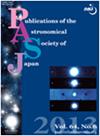银河系中心人马座B2扩展包层的硫同位素
IF 2.2
4区 物理与天体物理
Q2 ASTRONOMY & ASTROPHYSICS
引用次数: 0
摘要
同位素比率是探测恒星核合成和化学演化的好工具。利用IRAM 30 m望远镜对OCS、OC34S、O13CS和OC33S向银河系中心巨分子云人马座B2方向的J = 7-6旋转跃迁进行了高灵敏度测绘观测。选择具有光学薄且未受污染的线的位置来确定硫同位素比率。OCS和OC34S的32S/34S比值为17.1±0.9,OC34S和OC33S的综合强度比值为6.8±1.9。通过对32S/34S比率的独立和精确测量,我们的结果证实了32S/34S比率向银河系中心下降的趋势的终结,这表明银河系中心大质量恒星的产生有所下降。本文章由计算机程序翻译,如有差异,请以英文原文为准。
Sulfur isotopes toward the extended envelope of Sagittarius B2 in the Galactic Center
Isotopic ratios are good tools for probing stellar nucleosynthesis and chemical evolution. We perform high-sensitivity mapping observations of the J = 7–6 rotational transitions of OCS, OC34S, O13CS, and OC33S toward the Galactic Center giant molecular cloud Sagittarius B2 with the IRAM 30 m telescope. Positions with optically thin and uncontaminated lines are chosen to determine the sulfur isotope ratios. A 32S/34S ratio of 17.1 ± 0.9 was derived with OCS and OC34S lines, while a 34S/33S ratio of 6.8 ± 1.9 was derived directly from the integrated intensity ratio of OC34S and OC33S. With independent and accurate measurements of the 32S/34S ratio, our results confirm the termination of the decreasing trend of 32S/34S ratios toward the Galactic Center, suggesting a drop in the production of massive stars at the Galactic Center.
求助全文
通过发布文献求助,成功后即可免费获取论文全文。
去求助
来源期刊

Publications of the Astronomical Society of Japan
地学天文-天文与天体物理
CiteScore
4.10
自引率
13.00%
发文量
98
审稿时长
4-8 weeks
期刊介绍:
Publications of the Astronomical Society of Japan (PASJ) publishes the results of original research in all aspects of astronomy, astrophysics, and fields closely related to them.
 求助内容:
求助内容: 应助结果提醒方式:
应助结果提醒方式:


